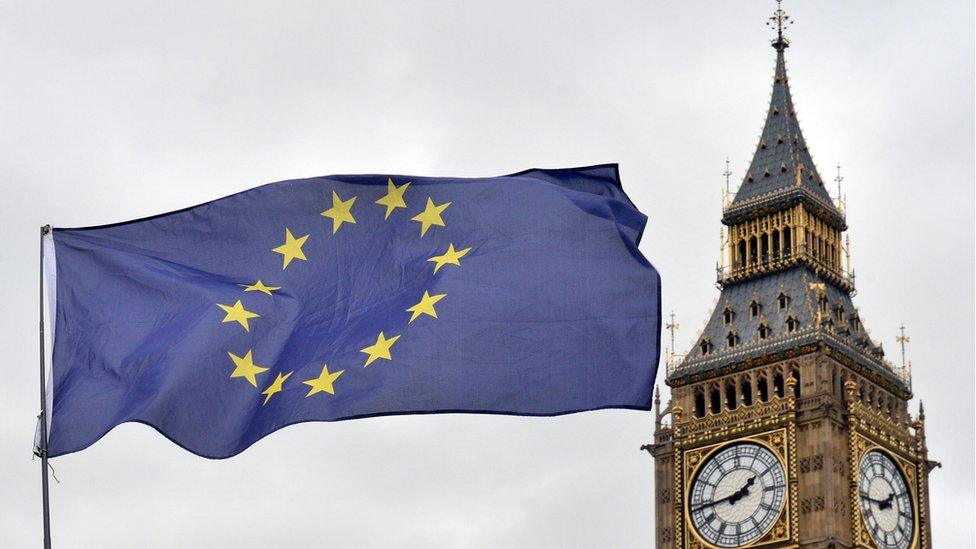No-deal Brexit 'worse than thought' for science
- Published

The impact of a no-deal Brexit on British science could be worse than previously thought, according to a new analysis.
UK researchers risk losing access to much of the EU funding that's currently available to them, it says.
The campaign group Scientists for EU has studied the Brexit technical notes released by the government on Thursday.
One of the documents states the UK would no longer be eligible for three of the EU's major funding programmes.
The analysis estimates that those streams of research cash provide up to 45% of the total of EU science funding coming Britain's way.
The government says it hopes to avoid leaving the EU without a deal and that it is working to ensure that the UK will continue to take part in European research projects.
What is the big concern?
UK scientists have been highly successful at bidding for European research grants, winning 4.6bn euros since 2014 from the EU's Horizon 2020 science programme.
When Britain becomes a non-EU country it should still be eligible to participate - countries like Israel have an associate status that allows them to take part.
And the government says it is a priority for relations to continue.
But three related research programmes are only open to EU countries, as the government's technical briefing makes clear, and these can be highly valuable.
The European Research Council (ERC) issues prestigious grants which have so far been worth a total of €1.29bn to the UK.

The government is considering what other measures are needed to support UK research in the event of a no-deal Brexit
Another set of grants, known as Marie Sklodowska-Curie actions, have totalled nearly €0.7bn for researchers here.
And a third programme, SME instrument grants, which are designed to encourage small innovative businesses, has seen nearly 140m euros heading to the UK.
According to Dr Mike Galsworthy of Scientists for EU, a non-deal Brexit "would mean losing over half a billion a year in high value grants".
He explained: "No deal would wreck nearly half the funding we're eligible for, it would be absolutely devastating."
Dr Galsworthy also highlights a potential problem with British applications to the elements of the Horizon 2020 programme that will still be open to the UK.
One of the conditions is that the coordinator of any grant must be from an EU member state or from a developing country.
So far, British researchers have had an enviable track record of leading EU-funded science projects - this role may now be at risk and may affect the scale of cash secured here.
So what happens next?
For many in the UK science community, the best hope lies in the government negotiating a deal that sees a close science relationship continuing with the EU.
And that's the emphasis too from the government itself.
A spokesperson for the Department for Business, Energy and Industrial Strategy (BEIS) said: "The government's priority is to conclude and finalise the Withdrawal Agreement. This would ensure that the UK's participation in Horizon 2020 would be unaffected when we leave the EU."
Ministers have repeatedly stressed that bids for EU funding will be underwritten up to 2020.

The ERC funds activity across all fields of research, with the emphasis squarely on excellence
The BEIS spokesperson added: "The UK has announced support for third-country participation in a no-deal scenario via the extension to the underwrite guarantee.
"We are considering what other measures may be necessary to support UK research and innovation in the unlikely event of no-deal."
Some figures in the world of science are putting their faith in Europe's next big science programme, Horizon Europe, which is due to start in 2020, and may be more open to countries outside the EU.
Dr Sarah Main of the Campaign for Science and Engineering (Case) told me: "It looks like the hints about greater openness are part of a genuine ambition to be more accessible to the rest of the world
"So that's a chink of light, and we do know that there's an appetite in the research community to find ways for UK and European researchers to work together in future."
But Dr Main also says that, in the meantime, the uncertainty of Britain's future relations with the EU is having an impact.
University College London has seen a drop in the number of fellowship applications from EU researchers and UK business has slipped from being the second largest recipient of Horizon 2020 funding to the fifth largest.
For Leave campaigners, the argument has long been that British science will benefit from being free of EU regulations on developments such as GM and being more open to collaborations beyond Europe.
Follow David on Twitter., external